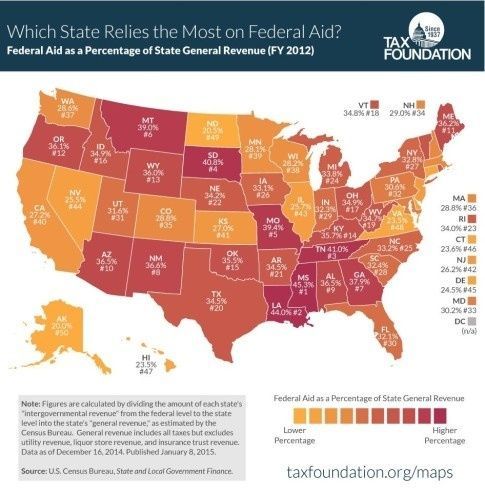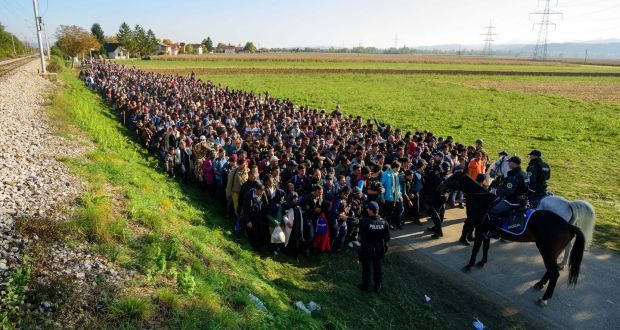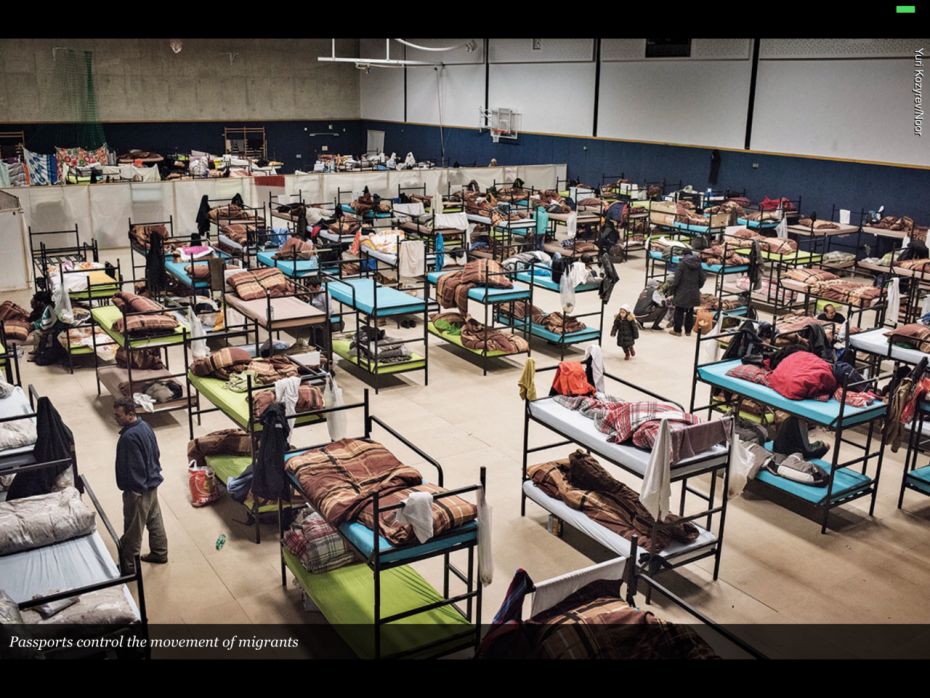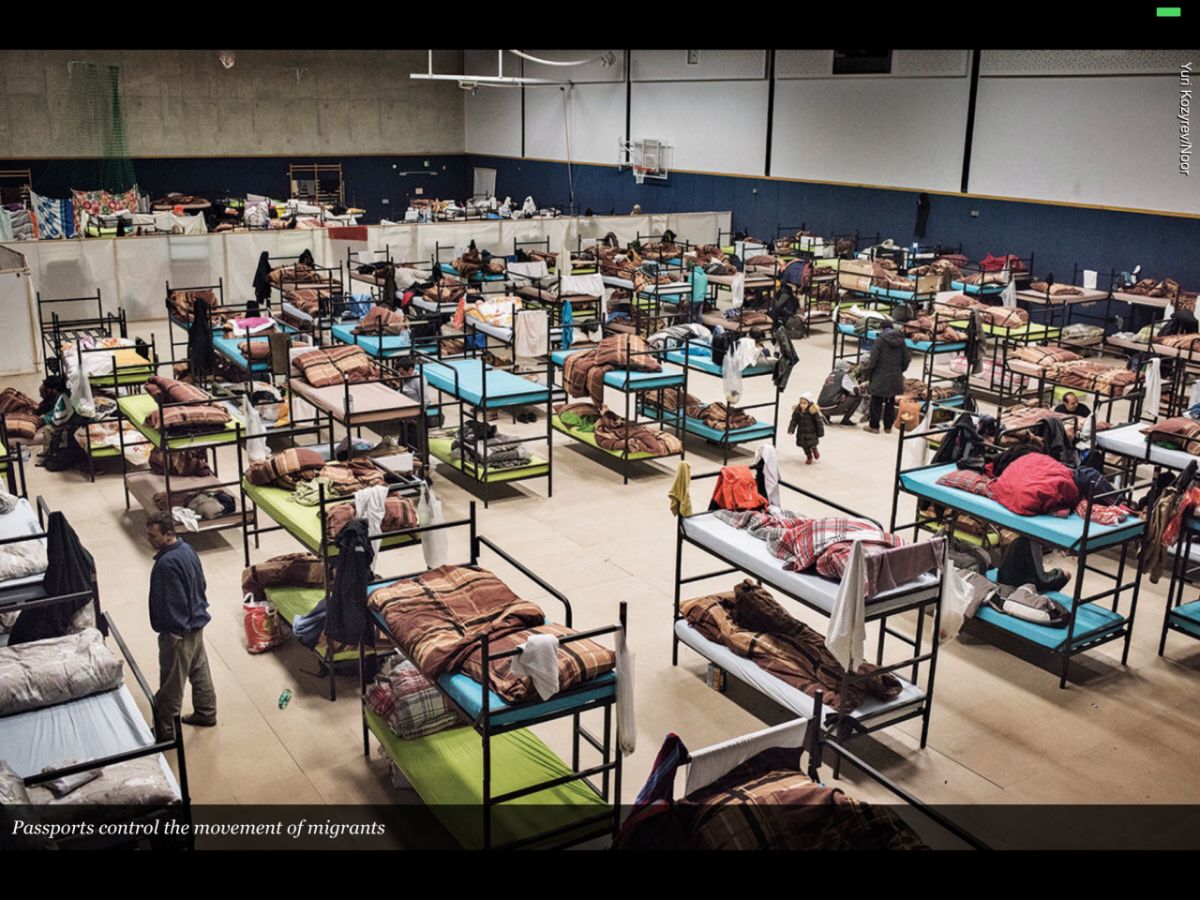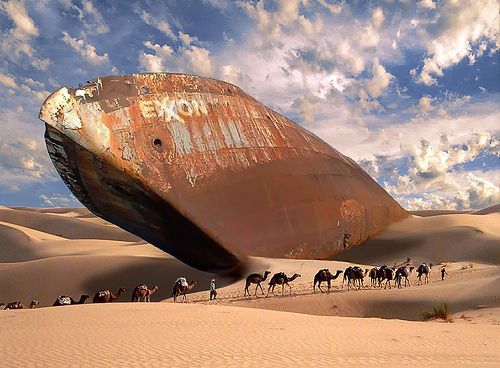IMAGINE THERE’S NO COUNTRIES
| May 9, 2016
I have a feeling the above line owes as much to Yoko as it does to Lennon, as she had been doing thought experiment art pieces long before Lennon’s song was written. I thought I’d try a similar thought experiment.
Are we moving towards a world without borders? Is that a good thing? We already all share a common fate on the planet, we essentially share the same global resources, the same air, climate and oceans. So, in the widest sense, yes, we already live in a world without borders and the whole planet is increasingly connected. Does Zika respect borders? Does El Niño? However, we live in a world of tribes, cultures and nations, all of which see themselves as different from one another, and that is not an entirely bad thing either. We live with this contradiction, which is further complicated by the relatively free flow of money and capital.
We didn’t always have passports and borders. It’s a relatively new thing.
From the New Scientist article “End of Nations: Is there an Alternative to Countries?”, September 2014:
Before the late 18th century there were no real nation states, says John Breuilly of the London School of Economics. If you travelled across Europe, no one asked for your passport at borders; neither passports nor borders as we know them existed. People had ethnic and cultural identities, but these didn’t really define the political entity they lived in.
From the New Scientist article “The Truth About Migration: How We Lived Without Passports”, April 2016:
Other than in wartime, authorities worried more about people getting out. Roman and medieval laws kept peasants bound to their farms. External passports were mere requests for safe conduct, rather than restrictive documents determining where you could go, says John Torpey at the City University of New York.
The main reason [for this] was that an individual’s nationality had little political meaning before the late 1700s. The passport as an instrument of state regulation was born of the French revolution of 1789. At first, ordinary people were issued passes to control internal movement, especially to Paris. But after the king tried to escape, and foreign aristocrats attacked the revolution, the authorities started requiring such papers for exit and entry to the country. The revolution created one of the world’s first “nation-states”, defined by the “national” identity of its people rather than its monarchs’ claims. “This novel importance of the people and their nationality made identity papers integral to creating the modern state,” says Torpey.
Timeline video of the History of Europe (3000 BC - 2013 AD)—it's a bit long, I know, but stick with it and you'll realize that you don’t see nation states emerge until quite recently:
Empires and tribes used to add to their wealth and prosperity by usurping the territories of their neighbors and protecting what they then felt were now their own territories. Prosperity increased by accretion. The people in those usurped territories may have spoken other languages and maybe had differing customs – it didn’t matter. They now had a new lord and owed some tithe to him. Not much of a change for many people, really.
Conflict was rampant, and eventually it was seen by rulers that war and conflict were quite inefficient as means of increasing wealth – one could prosper well without the death and expenses of war by trading, forming alliances and consolidating one’s territories.
Later, as mentioned above, nation-states as we know them came into being; often the Treaty of Westphalia is credited with being the beginning of this idea, signed in 1648 this treaty recognized the sovereignty of what later became nations, though at that time they were empires ruled by monarchs, not nations as we know them. The monarch, this treaty said, now ruled a proscribed kingdom, and the monarchs’ successors were to rule that same geographical area. The geographical area took primacy over the monarch. Neighbors were forbidden from interfering in the internal affairs of these “nations.”
People began to identify with these geographical zones more than with whoever happened to rule them.
From the Wikipedia page for “Westphalian sovereignty” (retrieved May 5th, 2016):
In the Westphalian system, the national interests and goals of states (and later what became nation-states) were widely assumed to go beyond those of any citizen or any ruler. States became the primary institutional agents in an interstate system of relations.. The "Westphalian" doctrine of states as independent agents was bolstered by the rise in 19th century thought of nationalism, under which legitimate states were assumed to correspond to nations—groups of people united by language and culture.
This idea reached its culmination with the American and French Revolutions – America and France being republics, or what we now refer to as states. Prior to this, the idea that a nation had a common language and culture didn’t exist – and the idea wasn’t accepted automatically. To get people to believe this idea there was needed a long period of nationalistic propaganda – with all the attendant symbols: hymns to flags, common coinage, national educational systems that taught a more or less a common story of what was considered the nation and people. These and other means were used to create a sense of unity amongst what were previously disparate peoples.
So, that’s sort of the backstory – in summary: borders and nations are relatively new and they proved at that time to be a less violent and more efficient means, via trade, of adding to prosperity than not having the secure borders.
Three things we know:
1. The planet has no borders. The physical world is all interconnected. CO2 emissions in China and the U.S. melt glaciers in Peru and subsequently Lima no longer has enough drinking water or electricity. Borders attempt to lessen those connections and allow for the avoidance of responsibility for one nation’s actions on others.
2. Global capital is essentially borderless. A company in London, for example, can be involved in extraction of resources, investment or manufacturing anywhere. In many cases, banks and corporations are not restricted by national borders. Money can move around fairly easily. Movement of money makes money – or seems to – we have places like Dubai that don’t make anything.
3. Labor, culture and commodities, however, are mostly geographically rooted.
For the most part people stay where they are; it’s risky and expensive to emigrate, and we like our familiar places and friends, though more and more people are now on the move. But usually if a corporation wants cheap labor it simply has to build factories in Indonesia, Mexico or China, where the people are – they don’t move those people to them.
Incompatible
The 3 givens above don’t always mix well – there are inherent incompatibilities.
When a U.S. corporation outsources its labor to Mexico or Indonesia, as is inevitable because capital is unrestricted by geography, the more expensive labor pool in the U.S. initially suffers, as has recently been confirmed.
But, taking China as an example, though the increased trade with them in the last couple of decades did in fact (as revealed recently) hurt middle and lower classes in the U.S., globally one might claim that there was a benefit. If one views employment from a global rather than from a local U.S. perspective it's possible that the overall rise in living standards of the vast numbers that were lifted out of poverty in China more than offset the decline of jobs in U.S....when viewed globally. Locally though, it’s has been a disaster.
Though politicians claim otherwise – as do many folks who are struggling – it seems the effect of NAFTA is still a matter of debate. The devaluation of the Peso around the same time maybe had an ever greater effect on outsourcing of jobs. Similarly, the outsourcing of jobs and manufacturing to China was not solely the result of a trade agreement. I was doing music tours at that time and often travelling to Mexico and it seemed to be that the knock-on effects were disastrous in both the U.S. and Mexico for everyone except the business owners and maybe the stockholders. Hard to believe NAFTA and the fall of the Peso were not somehow related, but OK.
But back to the Chinese effect and the global point of view. If a corporation can behave as if there are no borders then they can take that Godlike global perspective, and if indeed the outsourcing raises a substantial number of people out of poverty then they can claim they are globally not doing harm – though they may be viewed as a pariah back home. But the people in the various sovereign nations who must respect borders cannot take this point of view, or at least it’s very hard for them to take that perspective when they’re broke and their town is boarded up. To be realistic, though globally they may have helped lift many foreigners out of poverty they don’t have much investment in those places – in many cases they could care less about the education, medical or political system in those places as long as the factories and resources hold out. Ditto with the Chinese – all very well as long as their goods could undercut those made elsewhere.
But in many places there was pain. I toured around and saw lots of shuttered and boarded up downtowns – Detroit, sure, but also Cleveland, St Louis, Pittsburgh and more. It was shocking. Some are coming back, repurposed, but not all.
A global perspective is hard for humans to absorb and adopt – we naturally empathise with our families, our neighbors, our countrymen. But if you are capital, you might sometimes benefit from inflicting pain on your home country. Capital is more unfeeling and, in a cold sense, more utilitarian. It could therefore be viewed as sometimes being globally good – truly valuing the greatest good for the greatest number – if viewed globally, and if enough of those overall standards of living rose in China. Ugly and heartless maybe, but from the widest point of view it may be justified.
Trade and commerce have been in general an incredible engine for transforming the world – for innovation, the spread of new ideas, justice, information, health and the rise in living standards. Do we really want to restrict trade? This is the argument often used in favor of the various trade agreements….though those agreements are often bundled with other deals and provisions – responsibilities for environmental damage (or lack of it) for example.
Borderless zones
If we broaden our perspective as wide as is possible – to include the whole world – viewing everyone as our brothers, what would happen then? Possibly from that point of view would we be okay with the decline in U.S. jobs and manufacturing if it were offset globally? At the same time we would want to ameliorate that suffering, as we view all of us as having a common home and future? In a world without borders would we take a more utilitarian point of view? Taxing the wealthy in N.Y. does help the poor in New Mexico.
Borderless zones already exist – not over the whole world, but in recent zones that are larger than most nation states. The United States (note the name) is one such zone and the EU and the Russian federation are others.
The EU is having problems thinking of themselves as one unified “nation.” They feel unified in some ways, but they don’t pledge allegiance, not even metaphorically. They think of themselves as French or Greek or Italian (and the concept of a unified Italy didn’t even exist until relatively recently!) before they think of themselves as Europeans. Member states are not all equal in resources and economies. In some places it is accepted that the richer states help carry the lesser, in other consolidations this idea has been hard to swallow.
Here’s how it looks in the USA – where all are doing relatively well economically compared to other parts of the planet – but still, some states are in effect subsidizing aspects (highways, water, infrastructure, education, railroads, etc.) of others.
A recent analysis from Quora.com asked what would happen if, like the way Europe used to be, these states had to fend for themselves? Here’s what they found:
For Twenty states, the dissolution of the federal government would maybe be good news. They might save enough money in taxes to make up for the huge structural advantages of a Federal Govt, maybe not. However, the likelihood of any balkanization in a democratic system is low, because the majority of states would lose a big chunk of their yearly GDP, and would vote against it.
So, like the incentive for the Westphalia treaty – there’s an efficiency in union – some give up a little, but all prosper more. So the union, if the majority are represented, holds. There are initiatives to move the EU more in this direction, but even with the huge amounts of money they would save – truly massive amounts – there are some in Britain, for example, who advocate for Brexit. The reason seems to be fear of immigrants. Is this fear reasonable or is it based on imaginary ideas and biases?
Humans Without Borders
Again, the backstory...
From the New Scientist article “The Truth about Migration: We’re a Stay-at-Home Species”, April, 2016:
Humans have always migrated. Our species started as African apes and now covers the planet. Tales of migration are central to our religions, our literature and our family histories. And migration is at the heart of modern life. I am a migrant. You may be too. Some 38 per cent of scientists working in the U.S. and 33 per cent in the UK are foreign-born.
Yet they may be exceptions to an ancient rule: in fact, few people migrate. And when we do, often it’s because we feel we have no other option.
There is huge resistance to immigrants, and the Brexit seems to be more about fear of immigrants than it is about prosperity (studies overwhelmingly seem to show that Britain is much better off being part of EU). Past experience and research tell us that this instinctive sense that they’ve come for our jobs is false. Trump's fears of a wave of Mexican rapists descending on the U.S. have no basis it seems:
From the New Scientist article “The Truth about Migration: We’re a Stay-at-Home Species”, April, 2016:
Today, just 3.3 per cent of the world's people are migrants, little more than in 1990. Even within the European Union, where citizens are free to live wherever they choose, only 2.8 per cent, 14 million people, now reside outside their native country. "The idea that, without controls, everyone moves is contradicted by the evidence," says Philippe Legrain at the London School of Economics. "Niger is next to Nigeria, Nigeria is six times richer and there are no border controls, but Niger is not depopulated. Sweden is six times richer than Romania, the E.U. permits free movement, but Romania is not depopulated." Even strong economic incentives are often not enough to tempt us to leave home.
Mankind has done as well as it has, over eons, partly because we are mobile. So, if capital stands to benefit from being relatively borderless, why shouldn't labor/humans be allowed to be that mobile as well? In this view, shouldn’t people be allowed to go wherever the jobs, social benefits, opportunities, education, health care etc are better? If capital can, why shouldn’t people have the same rights and opportunities?
From the New Scientist article “The Truth about Migration: How Evolution Made us Xenophobes”, April, 2016:
All the evidence suggests that migrants boost economic growth. So why don't we just fly people who want to work to countries where there are jobs and welcome them with open arms? Prejudices rooted in humanity's evolutionary past may be partly to blame.
"Perceptions of competition drive a lot of our thinking and are difficult to avoid," says Victoria Esses at the University of Western Ontario in London, Canada. Humans think of their support systems as a zero-sum game – so if one person gains, another must lose out. Such perceptions were accurate during our evolutionary history as hunter-gatherers when the appearance of others on our patch meant fewer mastodons or mushrooms for us. If they were close relatives they might share – or at least our common genes would benefit from their success. But anyone displaying different cultural markers was likely to be a competitor. A modern capitalist economy is not a zero-sum game – if you add more workers, it grows (see main story). Regardless of this, our evolutionary hang-ups make it difficult to accept the economic sense in welcoming immigrants.
Immigration is a source of labor, intellect, culture, ambition and innovation – the waves of immigrants to the U.S. continually revitalized this country. Some of them were economic immigrants and some, like the Jews and more recently the Syrians, were forced immigrants fleeing persecution. The forced immigration that was slavery is a horror whose effects we still live with – but the descendants of those slaves have enriched everyone’s lives around the whole world, no matter who you are.
That said, what the above doesn’t say is that yes, there is an initial traumatic impact from a sizable influx of immigrants. Until the above benefits in jobs, taxes and the rest kicks in there is indeed a tough transitional period if there’s a sizable influx.
Climate change will exacerbate the movement of people – the need and desire to move will increase despite the innate desire to stay put as various regions become more difficult to survive in. Mass migrations will follow and this issue of borders will be something we will have to deal with.
Right now the countries closest to Syria – Turkey, Lebanon, Greece, and a few others – have vastly more immigrants and refugees than the more prosperous nations of Europe. If people were capital, these folks might have almost ALL magically appeared in Germany….or popped up the U.S. or Canada. It’s been pointed out that as Boko Haram, ISIL and other borderless groups expand their reach there will inevitably be more conflicts and waves of refugees from the Sahel. Syria might not be unique in that sense.
The Donald has said he wants to build a wall between the U.S. and Mexico – he’s tapping into a feeling that Latin Americans are travelling to the U.S. and taking U.S. jobs that folks (mainly white folks I’m guessing) in the U.S. feel they deserve to have. Though over time this isn’t true, the point is that’s what many people perceive to be happening. Perception is your reality, and even if inaccurate, it’s the reality we act on. These people may like the cheap Chinese and Mexican made goods and groceries at Wal-Mart, but at the same time they want to strengthen the borders for movement of people. Sounds to me that with the mobility of capital they will inevitably lose with that combination.
So, why have borders? Is there an argument for walls, tariffs and borders?
In my opinion, yes, there is – sometimes. Movement of people is, despite what’s happening now, relatively minimal, but movement of goods and capital goes on. Local development and innovation needs to be protected, nurtured and encouraged; if all economic and trade gates are opened then it inevitably becomes a dog eat dog situation and the more mobile and more powerful companies and nations will take the spoils – as they often have greater resources and have developed their technology first.
It’s been said (as has the opposite, to be clear) that much terrorism arises because of the lack of job opportunities in home countries (and the difficulty in both moving and being accepted somewhere else where there might be more jobs). This is another argument for nurturing and protecting local skills, people and resources. Dissatisfaction and frustration eventually affect everyone everywhere. Nothing remains local forever.Some countries have adopted protectionist policies. Gandhi famously wanted India to be self-sufficient – to fight back against being exploited, as he saw it, by the powerful British textile mills. He adopted the spinning wheel as a symbol –make your own clothes and cloth – let local industries thrive! It worked and it didn’t work. Some local industries flourished and developed under this protection while with others the isolation held them back.
The Chinese likewise adopted protectionist policies and until recently it seemed to be working for them – they, more than the U.S., became the envy of the Third World. They have massive tech companies too, which I suspect would never have survived if they’d allowed Silicon Valley unlimited access. From their point of view this is a good thing – and even globally, if it allows for competition rather than monopoly it’s probably better for all of us.
The Chinese don’t always play by the same rules as everyone else – the government funds and supports their steel industry, allowing them to undercut steel prices around the world. This has already caused many mills to close, causing thousands and thousands to be out of work and their towns and communities to fall into desperate straits. Around the world countries and businesses would like to enact tariffs on Chinese steel imports, but diplomatically and politically it’s tough because they need the Chinese for other things. There is no sword or stick to punish or enforce normal market behavior on the Chinese – nothing exists to make them play by the rules – unless all these other countries act in unison (hello EU, United States, etc). Acting together, maybe there is leverage – but essentially it would be form of a trade barrier or border, to protect whole groups of states.
So, eliminating the borders and acting in concert helps those states, but effectively it happens by raising borders with other powerful actors. Here, maybe is the key to maintaining a balance of power.
Borders and protections help nascent industries and evolving skills, which need nurturing and, just like we do with our children, we need to protect them until they’re sufficiently ready to fend for themselves. Likewise, new ideas need a space to develop, whether culturally, creatively or economically. They need to be able to fail, to find their legs and confidence, in the same way a herd protects its young from predators.
I’d argue that this protectionism is often a good thing – but then the tricky part is that it tends to overstay it’s welcome. At some point crop subsidies and protectionism aren’t needed and it’s time for the adolescent to leave home, but they’re not going to want to leave willingly. How do we determine when to allow interpenetration?
Should local resources be protected as well? Wow the record is pretty spotty here, the curse of commodities... Did the overall Russian and Nigerian economy benefit from all their oil? Maybe some, but I doubt very much of that incredible wealth trickled down either to regular people or to health and education. Then when resources are gone or the demand changes it’s a disaster. Relying on one main resource is historically tragic long term – but there is short-term wealth for some. Maybe being more self-sustaining – as Gandhi did in India – encourages a more diverse economy? And there’s a chance that locals have an interest in their local future – global corporations can simply move on when the well runs dry.
It’s been said (as has the opposite, to be clear) that much terrorism arises because of the lack of job opportunities in home countries (and the difficulty in both moving and being accepted somewhere else where there might be more jobs). This is another argument for nurturing and protecting local skills, people and resources. Dissatisfaction and frustration eventually affect everyone everywhere. Nothing remains local forever.
What if borders applied to capital as well as people?
To some extent, that’s what the Chinese did. It worked until recently, or seemed to.
Capital in New York can invest and open a manufacturing plant, fishery, mine or logging company in, for example, Vietnam, and though a good number of Vietnamese might be employed and their standard of living might rise, the lion's share of profits derived from the extraction and the manufacturing based on those resources (commons) goes to the one with the initial advantage. Manufacturing is where most value is added to commodities. If borderless capital can always match the cheapest resources with the cheapest manufacturing regardless of location then mainly capital will benefit and locals will get sucked dry and capital will move on.
One could say that’s just the way of the world, but ultimately it’s not sustainable; as capital moves from one place to another it will exhaust the world and all will suffer and those without the initial advantage will suffer most. There is no built in incentive for unfair extraction of resources or cheap labor. So should capital be as restricted as are people? It worked until recently for the Chinese.
In a small enclosed geographical or political area it is possible that resources (even human resources) can be self managed – if borders were to stop capital as well as people. But as those isolated areas are more and more rare in the world – as capital is increasingly mobile and concentrated – regulation, borders and a sword of enforcement are needed. Maybe it would be nicer to call it the hand of justice and fairness rather than a sword? (Though enforceability of some sort is needed)
This is protectionism, and some will cry foul. But isn’t it just as foul that capital is mobile and people are not? Rather than limiting capital, should we allow people to be mobile as well?
The other argument for borders is culture – one could argue that borders and immigration restrictions allow cultures to remain somewhat intact. To keep intact local values, cuisine, music, dance, language and ways of life we might need to protect these things? Do we want the whole world to be homogenized? Probably not – though as with multiculturalism within our borders, one could argue that little isolate enclaves are increasingly doomed, and in some cases they make it harder on their own inhabitants. Should they ever be protected?
The culture argument – that borders reflect cultural differences – is a tough one, as not all borders were established based on cultures. Cultural cohesion within a nation state was often something that emerged – it wasn’t there beforehand. In Africa and the Middle East borders were the result of colonial partitions and wars. Borders are often arbitrary and don’t respect cultures at all. If they did the Kurds would have a nation, for example.
But let’s pretend to some extent they do – that there is Ukrainian culture and Russian culture. Whoops, maybe a bad example – Russians intentionally flooded into the Ukraine many, many years ago partly in order to dilute that culture. Likewise, the Chinese in Tibet. One could argue that parts of Texas and New Mexico are still more Mexican than Anglo. Though the official language might be English in some ways Miami is a Latin American city.. But okay, we get the point. States, as arbitrary as they might be, perceptually at least do become identified and correlated with cultures. Global media can swamp local cultures and cuisine. Maybe culture is a value we don’t want to see destroyed… though mixing, fusion, evolution, all of that is good too. There is no such thing as purity.
What now?
I think there’s a lot we can learn from Europe – the safety nets, education and medical for all – but back to Westphalia. In order to economically compete they need to get over themselves a little and become a little more unified, broadly democratic and representative. Some of that they could learn from the U.S., though right now our democracy doesn’t bear much scrutiny.
What about the waves of dispossessed and the refugees? The immigrants from Africa?
This is a tough one because of the initial trauma. Though these people long for a better life – and most don’t expect it to be handed to them – they are willing to work hard, learn, educate themselves and fit in if they are welcomed. Many of the Syrians are already trained professionals! They’ve gone through hell – it’s not like they’ve taken the easy way out.
Much is beyond me, but I sense some economic protectionism works, for a while at least. And if it allows local economies, agriculture and innovation to flourish, then there might be less human traffic as well.
Will more unions of nations come into being?
I can imagine a group of unified African states at some point. There are lots of smart people and resources, and unity might give them more leverage.
Conclusion: Will we eventually see a world without borders?
We already do. In much business and capital – investment, exploitation of labor and extraction of resources can happen without immigration.
As with states and trade, those need enforceable regulation to protect some places from predatory practices of powerful actors.
So the answer is yes and no. We probably don’t need borders for people – we tend to stay put until extraordinary circumstances like wars, repression, droughts and poverty force movement. Climate change will increase those events, all of them. But overall we like being around our familiar friends family and people. Even if I know my happiness, health and safety net might be better in Scandinavia, let’s say, I haven’t moved there...and I could, I have an EU passport! Friends have moved to L.A. from N.Y. for the possibility a nicer house and maybe a yard that take a smaller slice of their income I expect. I know others who have moved to Berlin. So there is some movement, but overall not that much.
Trade and capital though – it’s a tough one. As mentioned above, my hunch is that there needs to be a balance of power. Big corporations and powerful nations can’t be assumed to act in ways that are not detrimental to others. There need to be forces strong enough to keep them in check. It seems to me those balancing counter forces can (now, that the world is all very interconnected) come from unions of nations acting to create a balance of power. Not through force or wars or threats of nuclear destruction, but by acting together to protect their own interests, resources and people.
The EU is supposed to do that, but members have trouble feeling allegiance to the greater whole, trouble expanding their circle of empathy and identity to encompass their neighbors. But it can happen – the U.S. is a pretty good example. Africa should probably band together as there is much human and other wealth there, ASEAN was created decades ago in Asia, and some aspects of the Pacific Trade deal attempt to create a union to counter the might of China (other parts of that deal and the proposed transatlantic deal are more heinous).
So gradually yes, borders can come down, like carefully removing bits from a house of cards. Sections can be changed, little by little when trade, immigration and other factors evolve in harmony. One aspect can’t change by itself, but when done in concert (like music!) the circle indeed can expand and widen.



